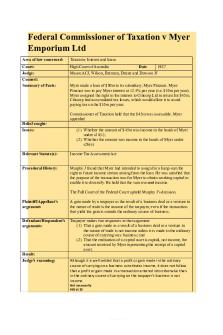Howard v Commissioner of Taxation Case Brief PDF

| Title | Howard v Commissioner of Taxation Case Brief |
|---|---|
| Author | James Tosswill |
| Course | Equity and Trusts |
| Institution | Macquarie University |
| Pages | 2 |
| File Size | 64.8 KB |
| File Type | |
| Total Downloads | 1 |
| Total Views | 155 |
Summary
Case Brief...
Description
CASE BRIEF TEMPLATE Name of Case
Howard v Commissioner of Taxation
Citation and Court
(2014) 253 CLR 83 High Court of Australia
Material Facts
Howard, a director of Disctronics Ltd, was one of six joint ventures who planned to purchase an underperforming golf course that would be leased to a substantial tenant and then sold to a buyer. Spotless Services Australia Ltd (Spotless) was identified as the potential substantial tenant. Howard was a director of Disctronics Ltd. The directors of DIsktronics had, during the development of the joint venture, decided that Disktronics would try to purchase the golf course from the joint venturers if it could afford to do so. The plan was not agreed to by the other joint venturers. The Joint venturers did not end up purchasing the golf course as planned because, unkown to Howard, it was purchased by a company established for that purpose by two of the other joint venturers. This company ended up leasing the golf course to Spotless. As the result of an action for equitable compensation against these two joint ventureres for a breach fo fiduciary obligations. Howard received the sum of $861,853.35. The issue before the High Court was whether that sum formed part of Howard’s taxable income. Howard claimed that the sum was held by him on constructive trust for Disktronics, on the basis that his fiduciary obligations as a director of Disktronics meand that the profit mad eunder the joint venture was not his, but rather belonged to Disktronics, with the consequence that the profit was taxable in the hands of Disktronics The Issue before the High Court was whether Howard’s participation in the joint venture was in breach of his fiduciary obligations owed to DIsctronics
Legal Issue
Relevant Law Application of Law to the Facts Conclusion
Not in breach, with result being that profit was part of his taxable income. Company was not, and never intended to be part of JV. Howards obligation as director did not extend beyond taking appropriate steps to try and give effect to a decision of the directors to try and bring the company in as the ultimate purchaser. No fid obligation preventing H from taking share of profits of the JV on his own account. Director-company attracts proscriptive fid duties, including a duty ‘not to obtain any unauthorised benefit from the relationship and not be in a position of conflict’ (Breen v Williams (1996) 186 CLR 71, 113.) Howards purpose in claiming that he breached fid duties was to avoid tax – ‘his purpose had nothing to do with the vindication or protection of Disctronics’ interests’. 275 ‘If there is no possible conflict between personal interest and fiduciary duty, and if the gain or beneft is not obtained by use or by reason of the fiduciary position, the fiduciary is not liable to account for the gain or benefit’ (French CJ & Keane J, at 101)
Howards entry into the JV did not involve the use of any knowledge or opportunity derived from his position as director (unlike in Boardman v Phipps) Hayne & CRennan J: ‘Unlike Regal (Hastings), [Howard] made no transaction in the course of his management of Disctronics. He did not obtain or receive the gain or profit by using in any way ‘the position and knowledge possessed by [him] in virtue of’ his office as director.3 The opportunity did not come to him by reason of his office (as director)....
Similar Free PDFs

Howard v. Kuntos Brief
- 1 Pages

Commissioner v. Tufts
- 4 Pages

Wesson v. Walmart - case brief
- 2 Pages

Morse v Frederick Case Brief
- 2 Pages

Graham v Connor - Case Brief
- 1 Pages

Barrenblat v US Case Brief
- 2 Pages

Spivey v Battaglia Case Brief
- 2 Pages
Popular Institutions
- Tinajero National High School - Annex
- Politeknik Caltex Riau
- Yokohama City University
- SGT University
- University of Al-Qadisiyah
- Divine Word College of Vigan
- Techniek College Rotterdam
- Universidade de Santiago
- Universiti Teknologi MARA Cawangan Johor Kampus Pasir Gudang
- Poltekkes Kemenkes Yogyakarta
- Baguio City National High School
- Colegio san marcos
- preparatoria uno
- Centro de Bachillerato Tecnológico Industrial y de Servicios No. 107
- Dalian Maritime University
- Quang Trung Secondary School
- Colegio Tecnológico en Informática
- Corporación Regional de Educación Superior
- Grupo CEDVA
- Dar Al Uloom University
- Centro de Estudios Preuniversitarios de la Universidad Nacional de Ingeniería
- 上智大学
- Aakash International School, Nuna Majara
- San Felipe Neri Catholic School
- Kang Chiao International School - New Taipei City
- Misamis Occidental National High School
- Institución Educativa Escuela Normal Juan Ladrilleros
- Kolehiyo ng Pantukan
- Batanes State College
- Instituto Continental
- Sekolah Menengah Kejuruan Kesehatan Kaltara (Tarakan)
- Colegio de La Inmaculada Concepcion - Cebu








